Search Results
Showing results 1 to 20 of 134
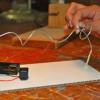
Circuit Game
Source Institutions
In this activity, learners build a game that tests their steadiness. Learners construct the game board by setting up an electrical circuit and a wand.
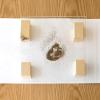
Electrical Fleas
Source Institutions
In this activity about electricity, learners explore how static electricity can make electric "fleas" jump up and down. Learners use a piece of wool cloth or fur to charge a sheet of acrylic plastic.

Magnets on the Move
Source Institutions
In this activity, learners investigate the behavior of magnets. Learners create a "wonder wand" with a magnet so they can move a skater around.

Magnet Mania
Source Institutions
In this activity, learners explore the relationship between electric charges and magnetic fields.

Working with Wind Energy
Source Institutions
In this activity, learners explore how wind energy can be generated on both a large and small scale.

Plugged in to CO2
Source Institutions
In this activity, learners investigate various appliances and electronics, discovering how much energy each uses and how much carbon dioxide (CO2) is released to produce that energy.
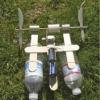
Electric Paddle Boat
Source Institutions
In this activity, learners build an electric two-paddle boat using paint paddles, plastic knives, and empty water bottles.
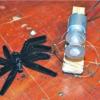
Creepy Crawlers
Source Institutions
Trick your family and friends with this creepy crawler that moves up and down. In this activity, learners construct a circuit and motor device that will move a homemade spider in a spooky way.

Make a Sun Clock: Tell Time with the Sun
Source Institutions
Before there were clocks, people used shadows to tell time. In this outdoor activity, learners will discover how to tell time using only a compass, a pencil, a handy printout, and a sunny day.

Eddy Currents
Source Institutions
In this activity related to magnetism and electricity, learners discover that a magnet falls more slowly through a metallic tube than it does through a nonmetallic tube.
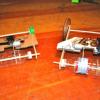
Bottle Cars
Source Institutions
In this activity, learners explore motion, energy, and electricity by constructing bottle cars that run on motors.

Solar Cell Simulation
Source Institutions
In this activity, learners model the flow of energy from the sun as it enters a photovoltaic cell, moves along a wire and powers a load.

Jumping Beans
Source Institutions
In this physics activity (page 3 of the PDF), learners will explore the concept of static electricity.

Fast Rusting
Source Institutions
In this activity, learners conduct an experiment to find out if steel wool will weigh more or less when it is burned. Learners will explore the effects of oxidation and rusting on the steel wool.
Shocking Fruit
Source Institutions
In this activity, learners discover how a piece of fruit can act as an electrolyte, conducting electricity between two different metals.
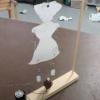
Electromagnetic Dancer: Connect Her Up and Watch Her Dance!
Source Institutions
In this activity, learners use a nail and magnet wire to build an electromagnet, which controls the movements of a paper dancer.

Motorized Balancing Toy
Source Institutions
In this activity, learners build a toy that flies in circles. This activity introduces learners to center of mass, torque, and rotational motion.
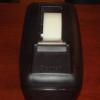
Tape Electroscope
Source Institutions
In this simple activity, learners create an electroscope by sticking two short pieces of magic tape together and then pulling them apart to find the sign of the charge on an unknown charged object.

Density Intensity
Source Institutions
In this activity on page 12 of the PDF (Rethinking the 3 R’s: It’s Easy to be Green), learners examine how recyclable materials are separated by various properties at recycling centers.
Floating Paperclip and Other Surface Tension Experiments
Source Institutions
In this activity, learners experiment with surface tension using everyday household items such as strawberry baskets, paperclips, liquid dish soap, and pepper.
